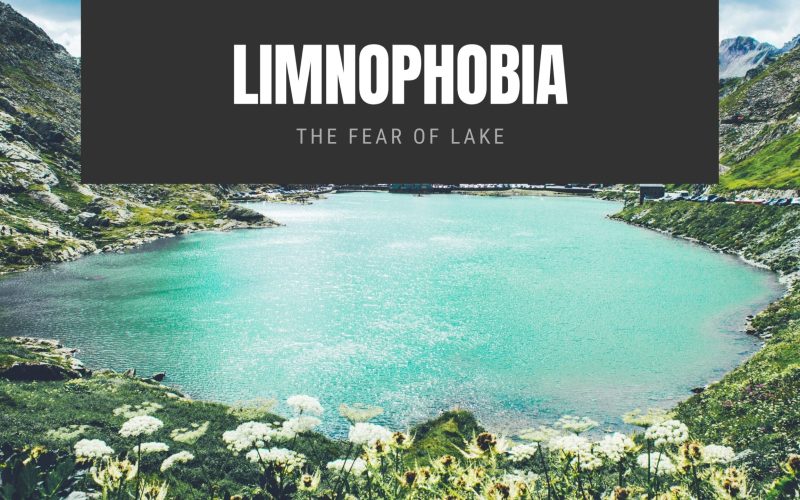Limnophobia is a somewhat rare fear, but it can be disruptive and disturbing to the sufferer. Limnophobia is the intense or irrational fear of lakes.
Someone with this condition may find it impossible to be near the lakes or even see them from a distance.
Depending on how intense a person’s limnophobia is, they may even have to deal with full-blown panic attacks that may cause them to be hospitalized. However, this is not the case for every single person.
Someone who is experiencing limnophobia may have to make some major life decisions that are based primarily on their mental illness.
For example, they may conclude that their irrational fear of lakes is so intense that they will do all they can to live in a place without lakes or bodies of water.
These patients may do this in an attempt to stay away from the very intrusive anxiety that is paired with limnophobia.
Even though a person who has this condition may feel as if it is the best way for them to lessen the intrusive anxiety that will inevitably come with being close to a lake, doing so may exacerbate their limnophobia as time goes on.
Avoidance of a fear object is a prevalent behavior among individuals who suffer from anxiety disorders, as it may help them to experience momentary relief from the anxiety that they feel.
It may also not be rare for someone with this phobia to fear places or objects that remind them of stagnant water or lakes.
For example, a person may experience fear when looking at marshes or boats, which is analogous to the fear they would experience when looking at lakes .
Symptoms
One of the most common symptoms of limnophobia or fear of lakes is anxiety. This is a symptom that is common with virtually every phobia.
Someone who has this condition may suffer anxiety that is so disturbing and intrusive that they may begin to find it difficult to cope with their day-to-day life.
They may spot a picture or video of a lake or sea lake content on TV, which may cause them extremely high levels of anxiety.
They may also realize that their limnophobia or intrusive fear of lakes is irrational, but they may not be able to convince themselves of this when in the presence of a lake.
Their inability to behave or think rationally about their intense fear of lakes and their difficulty sufficiently coping with very strong emotions may significantly worsen their limnophobia.
Besides having extreme fears of lakes, they may also suffer from other anxiety disorders as far as they have the genetic design to do so.
For instance, someone who has limnophobia may find themselves generally obsessing over their limnophobia or fear of lakes to the point where they possibly develop an obsessive-compulsive disorder (OCD).
This fact is one that’s very plausible to conceive as OCD often begins by having a very strong obsession with a specific fear (mainly depending on their genetic makeup).
Below are some more common symptoms of fear of lakes or limnophobia:
- Anxiety when thinking about a lake
- Intense anxiety when near a lake or when looking at a lake
- May experience full-blown panic attacks
- Muscle tension and an increased heart rate
- Unable to cope with very strong emotions
Causes
Just like every other phobia that exists, there is no identified cause of limnophobia. However, a person’s environment and genetics may play important roles in their development.
For example, suppose a person has a family history of conditions like mental illness, especially with phobias or anxiety disorders. In that case, they may have a higher chance of developing a fear of lakes and limnophobia.
This may have to do with their higher chance of living with a genetic predisposition to develop such mental illness.
Suppose they were discovered to have such kind of genetic predisposition. In that case, all it may require is that they experience some traumatic event for them to suffer a full-blown limnophobia.
A traumatic experience of such type may be that they almost got attacked around a lake, got drowned in a lake before, or they may know someone who had drowned in a lake or some other severe experience.
Though nobody knows what exactly causes the fear of lakes or limnophobia, professionals can look at a patient’s family history and their past or present environment to help better indicate the possibility of them developing a fear of lakes or limnophobia.
It is also entirely plausible to conceive that a person may develop this condition because they are already suffering from a different anxiety disorder like an obsessive-compulsive disorder OCD or a generalized anxiety disorder (GAD).
Treatment
No known method of treatment is specially created for this condition. However, one of the treatment methods that may be of great benefit to a person with this phobia or any other kind is exposure therapy.
Exposure therapy has been one of the most common types of therapy for the treatment of phobias.
Just as the name of the treatment method implies, it works by having a therapist slowly expose a patient to fear of lakes or any other phobia to that which they fear.
Theoretically, the more a patient is exposed to what they are afraid of, the less it will bother them.
As the method of treatment relates to limnophobia, the therapist may have to “expose” the patient to lakes in each therapy session. The therapist will begin by showing the patient images or footage of lakes.
These therapists may also ask their patients to go close to lakes on their own time to expose themselves to a real-life lake gradually.
Though this may cause the patient intense anxiety, the goal is for the patient to eventually be desensitized to their fear of lakes by constantly being exposed to them.
Exposure therapy is a great treatment option, but it is not for everyone, as it can trigger an extremely high level of intrusive anxiety.
With that being said, it must be implemented by a very experienced therapist who has also treated phobias before.
This will also help to increase a patient’s success rate. In addition to anti-anxiety medication, exposure therapy may also be advantageous, but you and your doctor must discuss it first.
If you think that you may have limnophobia, or if you are dealing with one or more symptoms of this condition, then you must talk to your doctor as soon as possible so that you can be properly treated and diagnosed.
After seeing your doctor, you may be referred to a specialist, such as a therapist or a psychiatrist, to help treat your limnophobia better.







